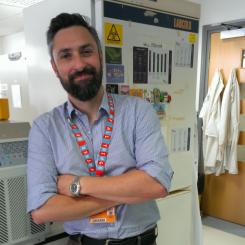 Dr William English
Dr William English
University of Sheffield
Awarded: £49,686
The challenge
The first step in finding new treatments for soft tissue sarcoma is understanding the genetics and molecular mechanisms that cause STS to develop and become aggressive, fatal cancers. But before these treatments can be used in STS patients, they have to undergo testing in the laboratory. This happens first in isolated cells in the lab, and finally in cancers grown in a whole-body system to ensure they can target the sarcoma without harming the patient. Until recently there have been few good-quality models of soft tissue sarcoma available for use in the laboratory – which is what this project aims to change.
How will this project tackle this challenge?
Assisted by previous funding from Sarcoma UK, Dr English and his colleagues have been able to improve this situation by successfully growing cells from STS patients in the laboratory. The team can translate this to models which better mimic how cancer behaves in the body. But at the moment the method can be slow and unreliable, so more needs to be done before the models can be used to investigate treatments for patients.
This project will fill the next gap in the journey to testing treatments by producing models of sarcoma in mice. The team’s work will help ensure that sarcomas can be grown more reliably and quickly, so the tumour models can be used to generate the essential data that is needed before we can start clinical trials in patients, while also improving welfare of the mice at the same time.
What this means for people affected by sarcoma
More treatments are needed for soft tissue sarcoma, especially for those patients whose cancer has spread to other parts of the body. But a lack of good-quality models is one of the biggest barriers to producing new treatments for sarcoma. This project will address a real unmet need in ensuring that new drugs are tested in an environment which closely mimics that of a real patient as quickly and effectively as possible.
A lack of good-quality models is one of the biggest barriers to producing new treatments for sarcoma: this project aims to address a real unmet need.








